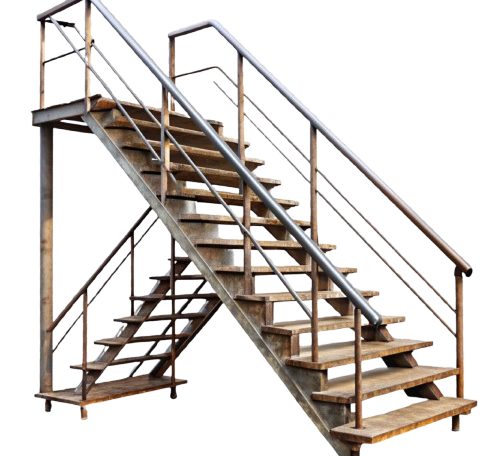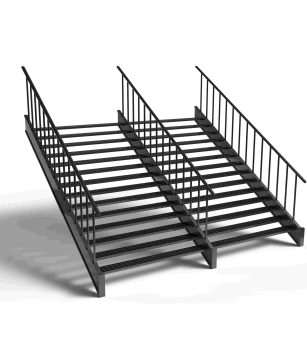When constructing stairs, one of the most critical decisions homeowners and builders must make is selecting the suitable material. Steel and timber are two of the most popular options, each with its own set of advantages and drawbacks. However, in today’s fast-paced world, where durability, aesthetics, and safety are paramount, steel is increasingly recognised as the superior choice for stair construction. Here, we’ll explore the compelling reasons why steel outshines timber for stair projects, particularly in urban environments like Melbourne, where Around Town Site Services (ATSS) excels in steel fabrication and installation.
1. Durability and Longevity
One of the foremost advantages of steel stairs is their exceptional durability. Unlike timber, which can warp, splinter, or rot over time, steel is resistant to various forms of wear and tear. Environmental elements that can seriously damage timber structures include moisture, temperature swings, and insect infestations. This may need costly replacements or repairs.
In Melbourne, where the weather can change rapidly, metal staircase maintains their integrity, ensuring safety and structural soundness for years. Its durability translates into lower maintenance costs and fewer replacements, making it a wise long-term investment for homeowners and businesses. The longevity of steel also means that the initial investment pays off over time, as the need for repairs is minimised.
2. Strength and Load-Bearing Capacity
Steel is well known for having an outstanding strength-to-weight ratio, allowing it to bear significantly more weight than timber of similar dimensions. This capability is very useful in business environments where heavy foot traffic or equipment might be involved. Steel staircases are ideal for a variety of applications because they can be designed to support heavy weights without sacrificing their structural integrity.
Timber, while a popular choice for residential staircases, has inherent limitations regarding load-bearing capacity. Over time, even well-constructed timber stairs can sag or bow under heavy use, posing a potential safety hazard. Metal stairs, on the other hand, provide the peace of mind that comes with knowing your staircase can withstand the demands placed on it, ensuring safety for all users.
3. Safety and Fire Resistance
When designing stairs, safety is the top priority, and steel stairs offer significant advantages in this area. Steel won’t burn or release harmful fumes in the event of a fire since it is intrinsically non-combustible. This makes steel an ideal choice for both residential and commercial properties, where building codes often mandate fire-resistant materials.
Timber, conversely, is flammable and can contribute to the rapid spread of fire. In emergency situations, this poses a severe risk to occupants. When selecting materials for stairs, prioritising safety is crucial, and steel provides a clear advantage by reducing fire risks significantly. In addition, steel stairs often come with features such as non-slip surfaces and reinforced handrails, further enhancing user safety.

4. Aesthetics and Design Flexibility
While functionality is essential, aesthetics also play a vital role in stair design. A variety of design options are available for steel staircases in Melbourne, which can be used to match different architectural styles, from modern minimalist designs to more traditional looks. With various finishes available—such as powder coating, galvanisation, or even Steel stairs, in their raw form, they can be elegantly incorporated into multiple interior and exterior design styles.
The versatility of steel allows for innovative design options, including floating stairs, spiral staircases, and intricate balustrades that can be customised to match your vision. While timber may offer a classic, warm look, it often lacks the same level of design flexibility that steel provides. For those looking to make a bold statement with their staircase, steel is the material that can rise to the occasion.
5. Environmental Considerations
The selection of building materials bears great importance as sustainability becomes an ever-more-important consideration. Steel is a recyclable material, meaning that at the end of its life, it can be repurposed and reused, minimising waste and reducing the carbon footprint associated with manufacturing new materials. Many steel manufacturers, including ATSS Fabrication, prioritise environmentally friendly practices, making sure the steel they utilise is produced with as little impact on the environment as possible and is obtained responsibly.
Timber, while often considered a renewable resource, raises concerns regarding deforestation and habitat destruction. Not all wood is sourced sustainably, and the demand for high-quality hardwoods can lead to environmental degradation. In contrast, steel often emerges as the more eco-friendly option when considering sustainability.
6. Cost Efficiency
While the initial investment for steel stairs may be higher than that of timber, it’s essential to consider the long-term cost implications. Steel’s durability means fewer repairs and replacements over time, leading to significant savings. Additionally, the maintenance requirements for high quality steel staircasesare considerably lower than for timber, which often requires regular treatments, refinishing, and inspections to prevent issues like rot and pests.
Over time, the cost of maintaining timber stairs can accumulate significantly, whereas steel’s longevity and low upkeep make it a cost-effective solution. For homeowners and businesses looking to minimise ongoing expenses, steel is the better choice, offering peace of mind that comes from a reliable, low-maintenance option.

7. Customisation and Accessibility
Another often overlooked advantage of steel stairs is the ability to customise them for accessibility. With the proper engineering, metal staircases can easily accommodate ramps and other accessibility features, making them suitable for individuals with mobility challenges. Timber, while it can be modified, often presents limitations when it comes to meeting stringent accessibility standards.
Additionally, the structural integrity of steel allows for wider stair treads and more supportive handrails, enhancing safety and accessibility for all users. This adaptability makes steel a forward-thinking choice for modern construction projects prioritising inclusivity.
Conclusion
Steel always turns out to be the better choice when it comes to stairs, but when compared to timber, steel consistently proves to be the superior option. Its unmatched durability, strength, safety features, design flexibility, environmental benefits, and long-term cost efficiency make it a perfect material for use in business and residential settings.
For those in Melbourne seeking expert steel fabrication, installation, and design services, Around Town Site Services (ATSS) is your go-to provider. Their experienced team can help you create customised steel staircase solutions in Melbourne tailored to your needs, guaranteeing a stylish and secure addition to your house.
Ultimately, choosing steel over timber for your stairs is not merely a matter of aesthetics; it’s a decision rooted in practicality, safety, and sustainability. By embracing the future of construction and opting for steel, you’ll enjoy the peace of mind that comes with making a solid, enduring choice. Whether you’re looking to install a striking staircase in your home or a durable solution for your commercial property, steel is the material that can meet and exceed your expectations.

